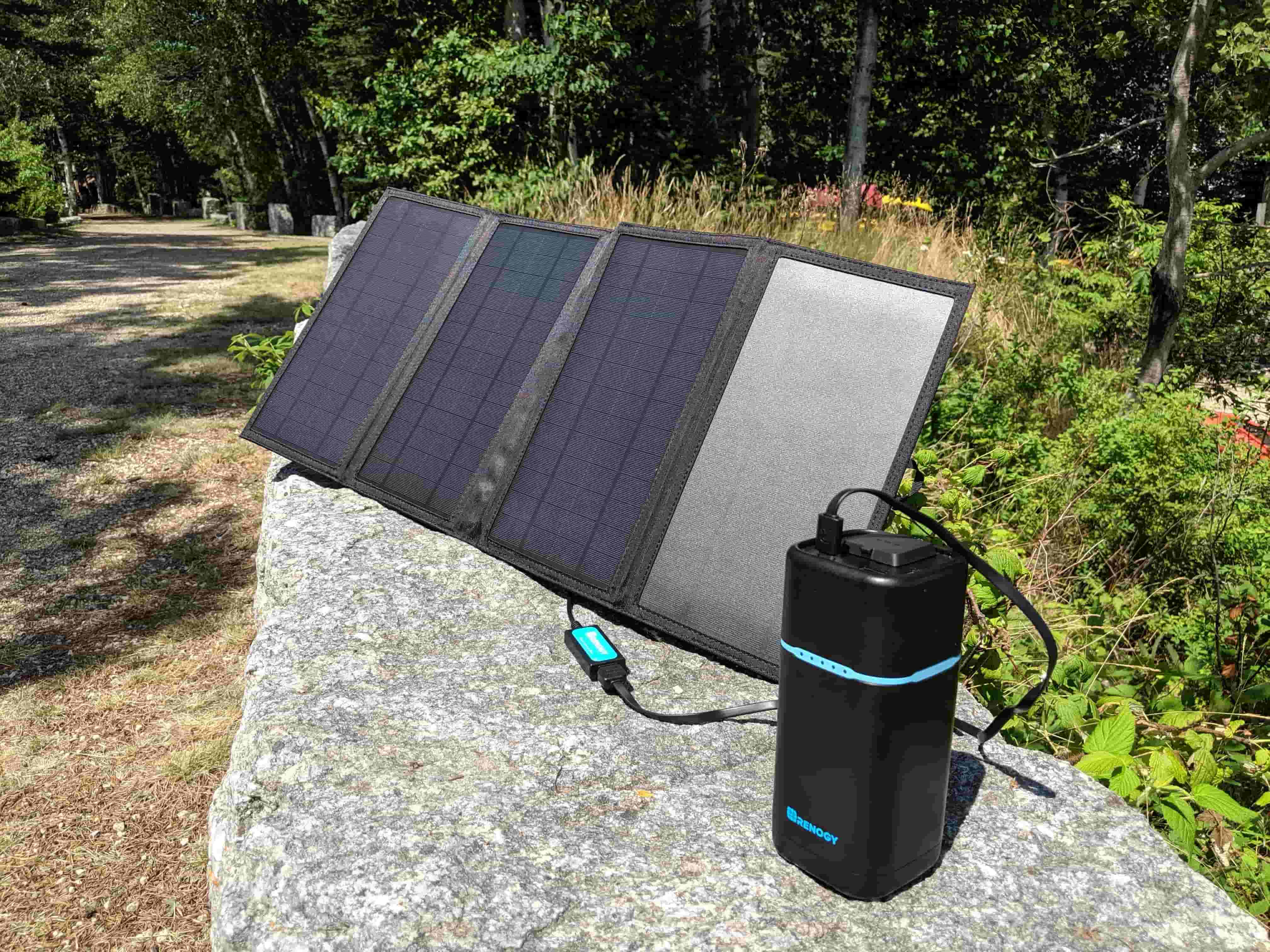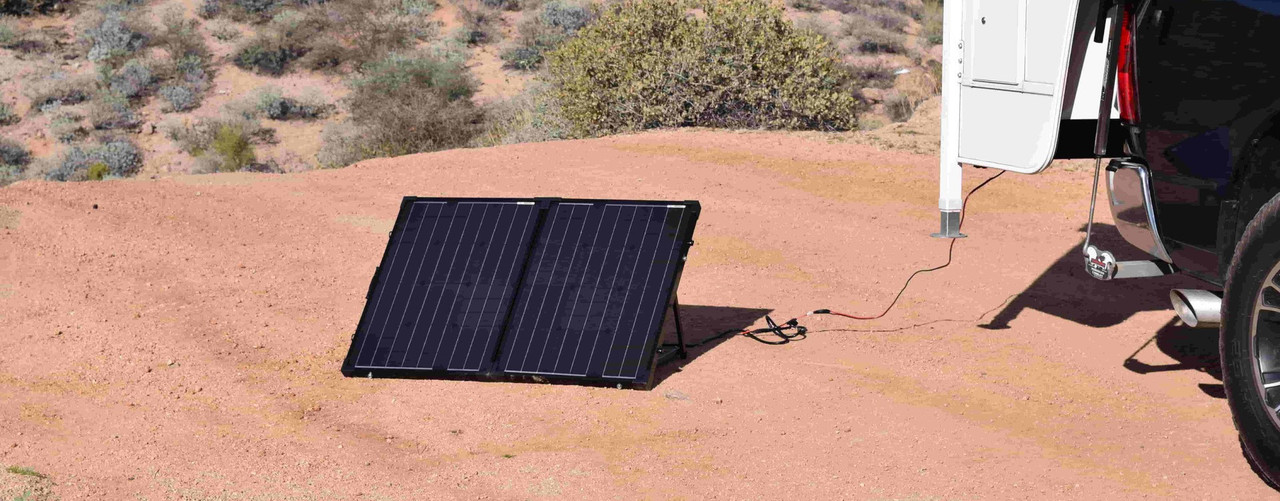What to Know About Portable Solar Panels
Are portable solar panel systems worth it?
Going solar without roof mounted solar, from flexible solar panels to solar generators
Those that live a mobile lifestyle know they have to be creative when addressing their energy needs. If you’re a van, RV, or motorhome dweller, it’s never been easier to generate energy off-grid thanks to portable solar panel systems. Portable solar panel systems are a great, affordable solution for many individuals, especially those who aren’t ready for a roof-mounted system.
What are Portable Solar Panel Systems?
Portable solar panel systems give you the ability to generate and store your own electricity using lightweight, portable solar panels, charge controllers, batteries, and inverters. Instead of mounting to the roof, portable solar panels are available in a few different forms, from folding suitcase panel kits that can be set up on the ground to flexible panels that can be hung from your vehicle or other vertical surfaces.
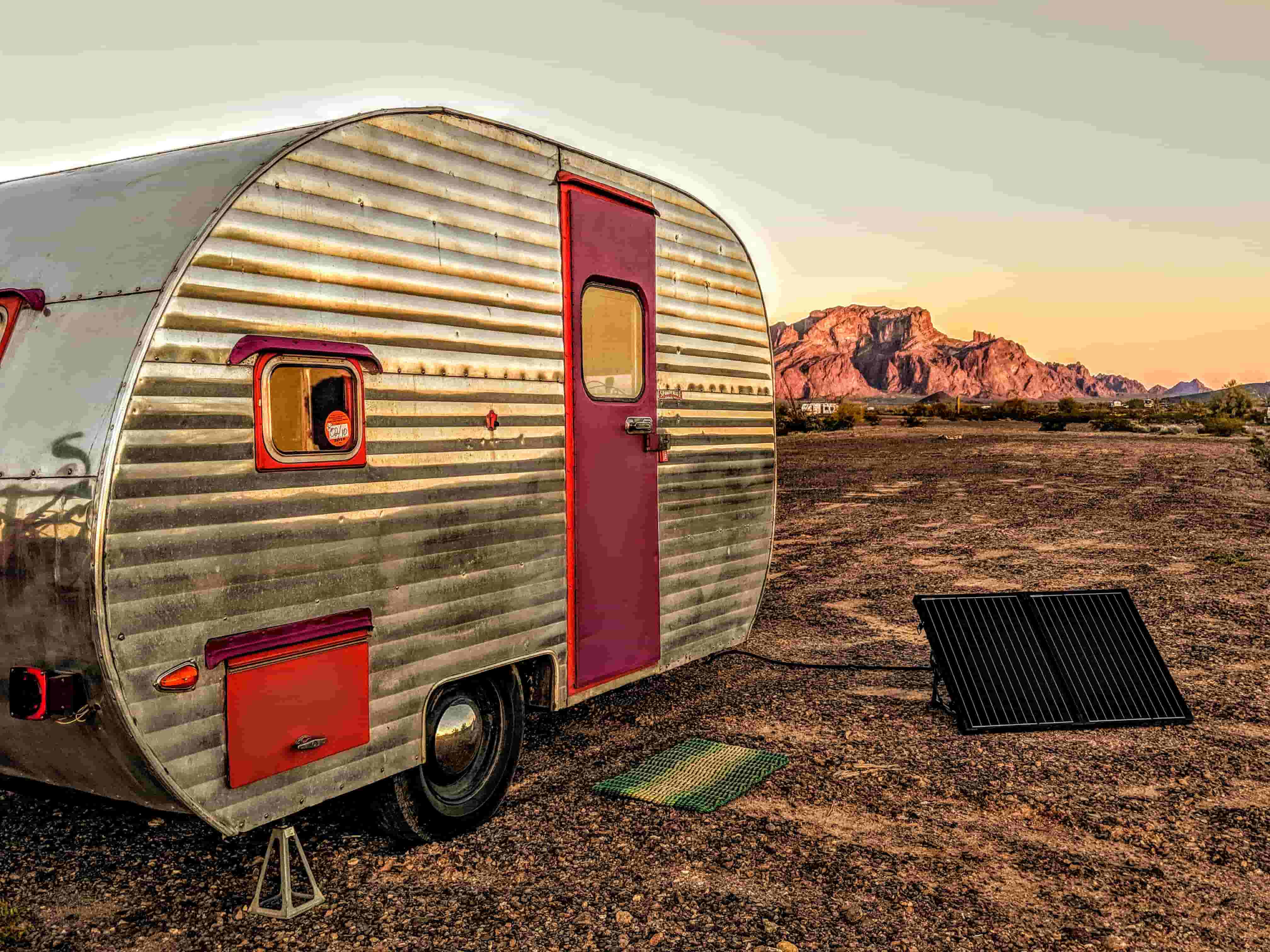
Like roof mounted panels, portable solar panels are made up of many solar cells made of silicon. Panels have both a positive and a negative layer, which creates an electric field. When sunlight hits solar panels, they create an electric current. Panels are then connected to a charge controller, which controls how much current goes through a battery. Batteries store and produce DC power. In order to use household AC appliances, such as blenders, laptops, and phone chargers, an inverter is used to change the power from DC into AC power.
Portable solar systems give you the ability to generate solar whether you’re at a cabin or in your RV, all with one system.
Also, for those with smaller energy needs or just need access to back-up power in case of emergencies, solar stations, such as Renogy’s 5000 watt solar generator, are a great solution. They eliminate the need to worry about extra inverters, batteries, or wiring. It’s all included. Just hook up one of the compatible Renogy solar panels and you’ll be to access the energy of the sun.
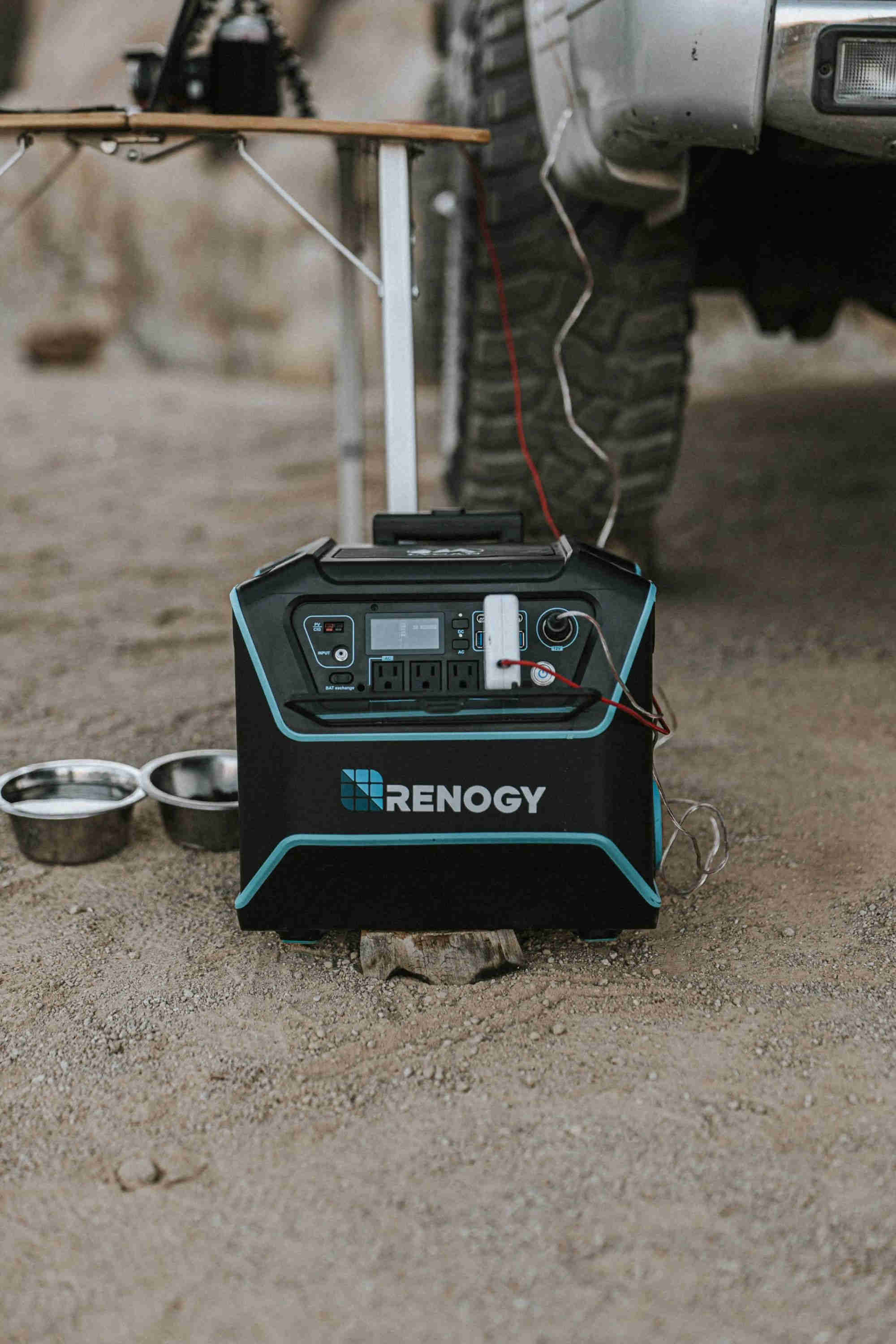
ROS of Portable Solar Panel Systems
If you don't think you are going to need a lot of solar power, or you cannot justify installing roof mounted solar panels, portable solar power systems are a great option.
You can move them between vehicles or home.
A benefit of their portability is you can use it for multiple rigs, from your car or van to an RV. They can also be a great addition to a disaster preparedness kit.
You have more freedom with how you park.
With roof mounted panels, you’re often limited to which direction you park because you have to make sure the panels on your roof get maximum exposure to sunlight. With portable panels, you can place them wherever you need to.

It’s a great way to dip your toes in the solar waters if you’re not ready to mount panels on the roof.
If you’re new to solar panels and want to test it out before going through the full process of installing panels on the roof of your van or RV, portable solar panels are a great way to start harnessing the power of the sun.
Cons of Portable Solar Panel Systems
You have to set them up every time.
Because your panels aren’t mounted on your roof, you’ll have to set them up whenever you’d like to start charging your batteries. It’s not as convenient as just flipping a switch.
You can’t charge while you’re not present without risk of theft or damage.
One major benefit of rooftop panels is being able to charge panels while you’re away from your vehicle. However, if you’re concerned about theft or damage to the panels from weather or other outdoor elements,portable solar panels may not be the best option for you.
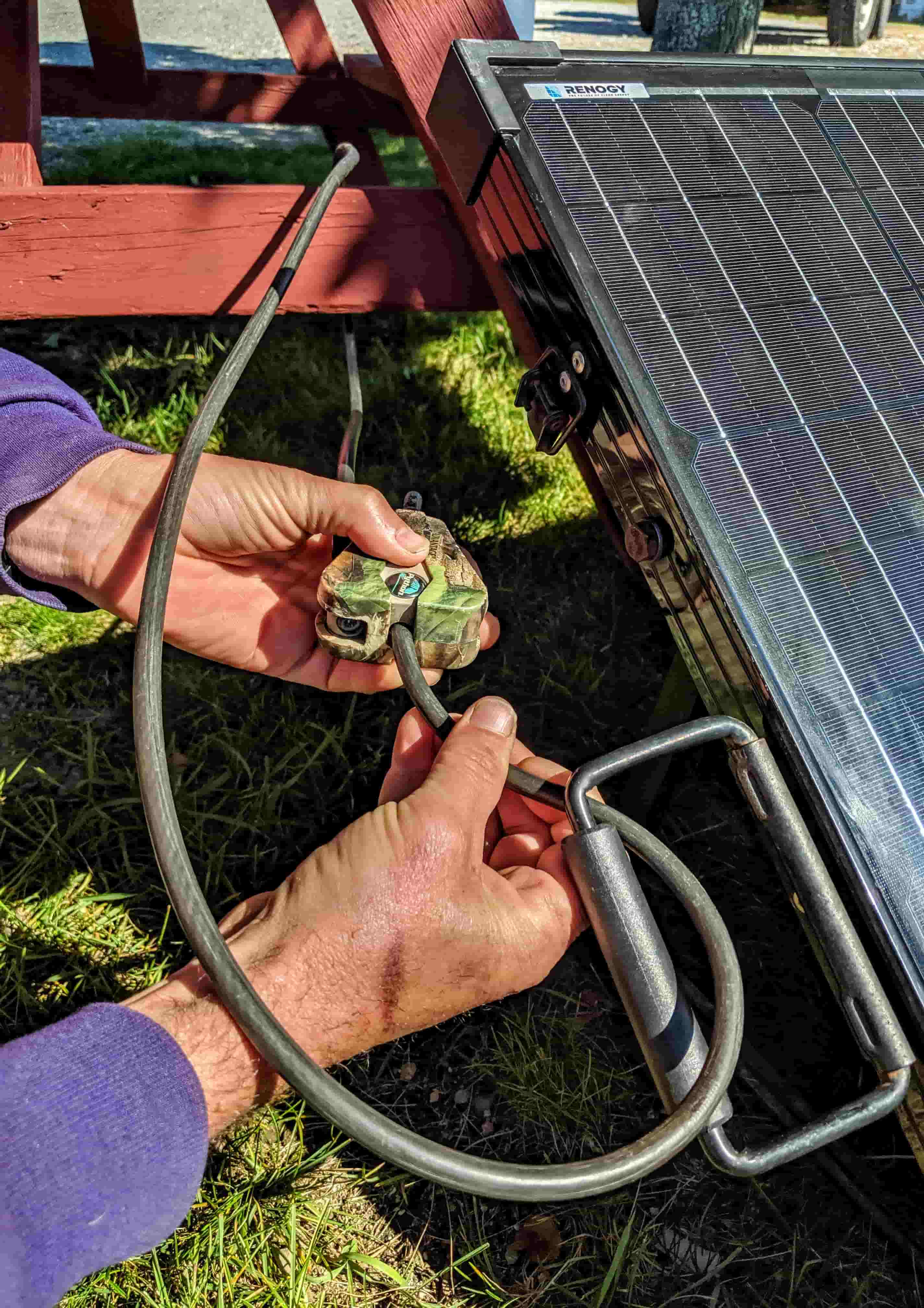
Are Portable Solar Panel Systems For Me?
I’m a weekend road warrior: Yes, portable solar panel systems are great for you. Portable solar power systems typically generate less energy than roof-mounted systems, but because you’ll only be camping on weekends, they should be more than enough to keep you charged on the open road.
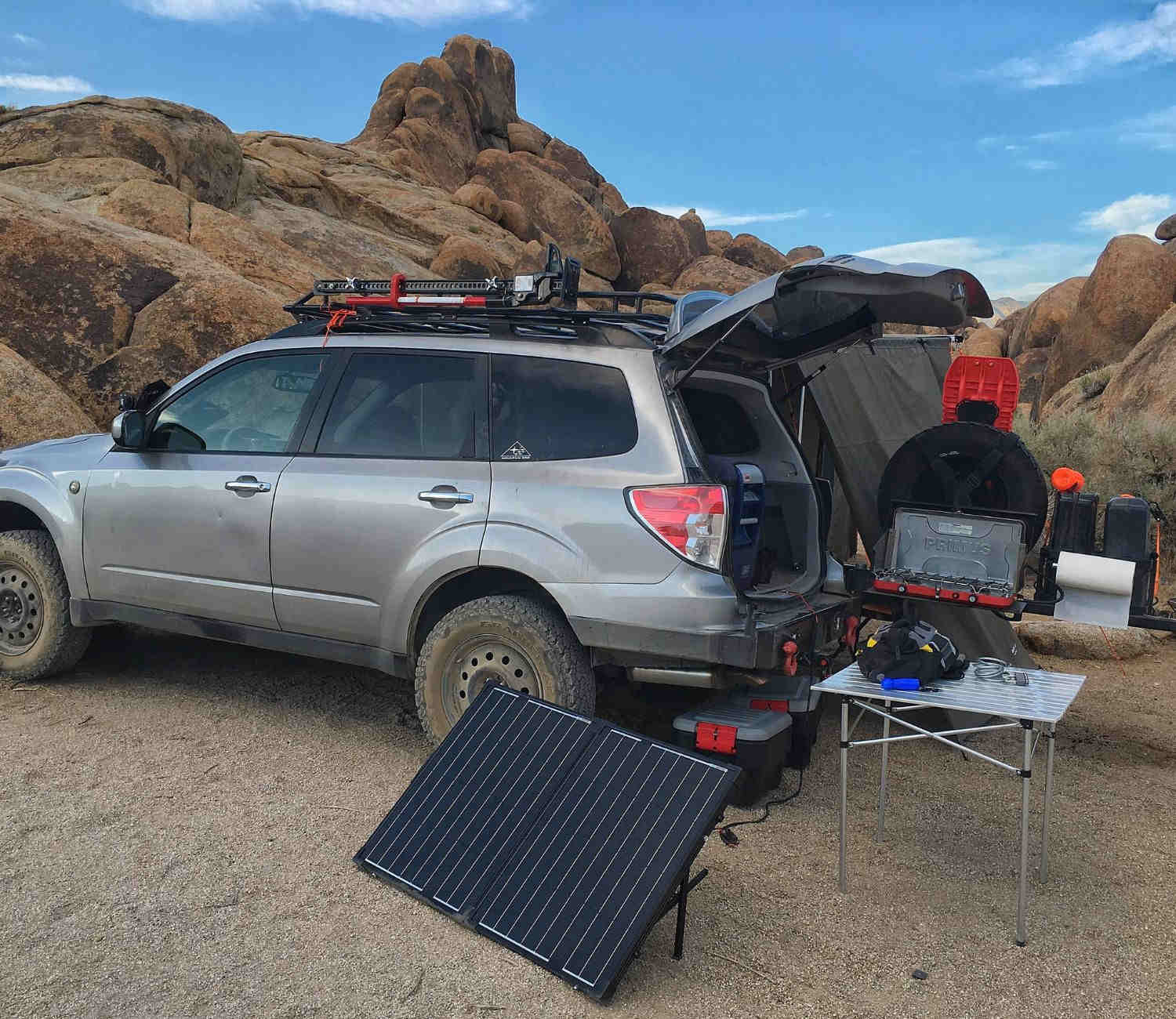
I’m a boondocker full-time: We’d recommend a full roof-mounted solar panel system.
If you’re someone that often stealth camps in parking lots of urban areas, or in rest areas or other public areas around other people, a portable solar system may not be the best solution.
That being said, if you typically camp in remote areas, such as BLM land or national forests, a portable solar system could be a great solution for you. Keep in mind though that you’ll be able to install more panels on a roof to cover the maximum amount of energy needs. You also won’t have to worry about setting up enough panels outside your vehicle and exposing them to wildlife or the elements. Renogy has a range of roof-mounted kits for RVs available too.
I camp at RV parks and campgrounds with full-hookups: Yes, a portable solar panel system is a great back-up power solution.
If you’re typically camping in areas with access to shore power, you may not need a big roof-mounted system. Being able to set out panels if and when you need them to charge your batteries can be a great way to address your energy needs as an RV dweller.
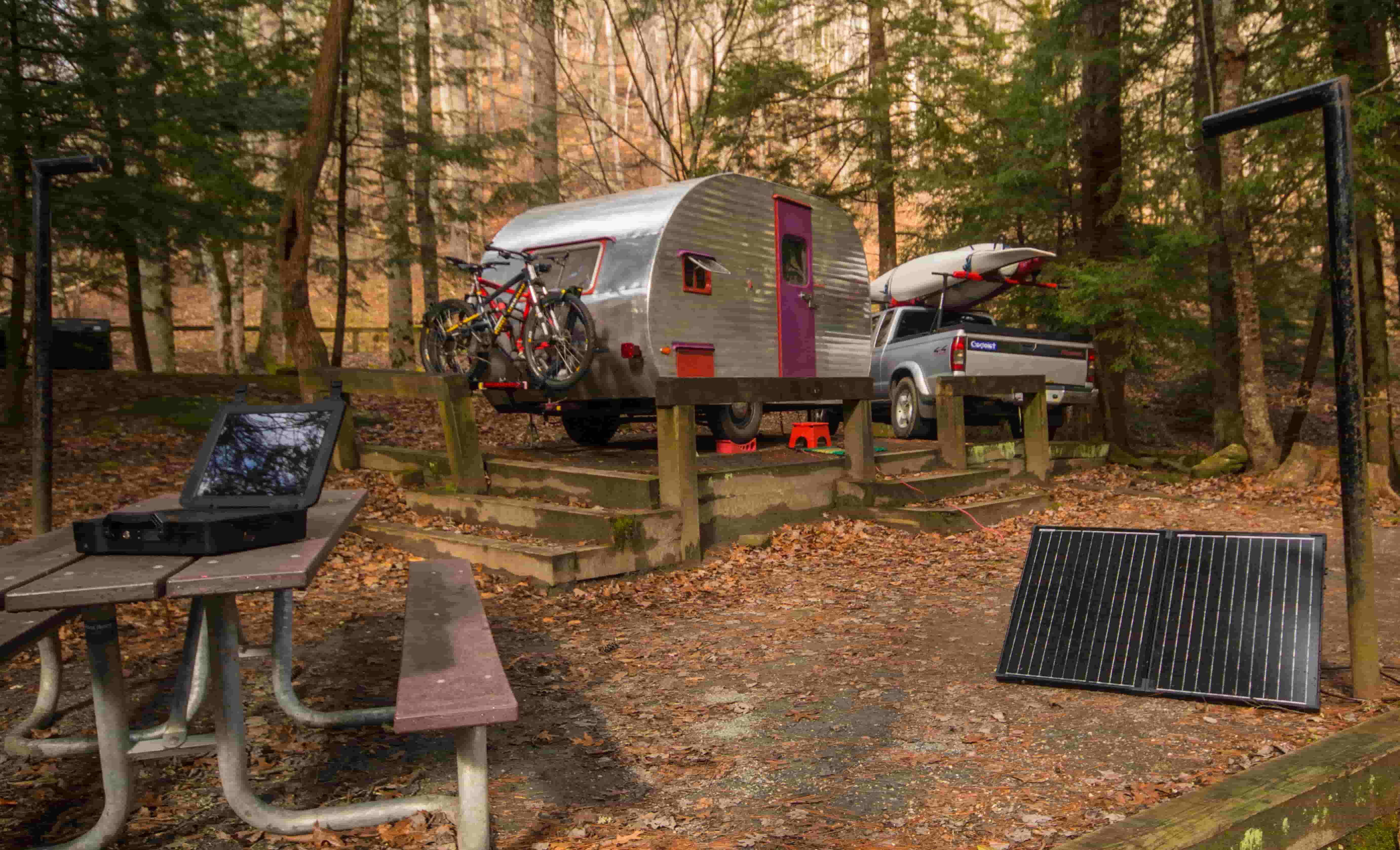
I live in a cabin off-grid: We’d recommend a full roof-mounted solar panel system.
If you live in a cabin or tiny home with steady energy needs, we’d recommend looking into a rooftop installation. Mounting on the roof eliminates the need to have to worry about regularly handling different components, such as panels, and it’s also more cost effective for large systems to invest in a rooftop mounted system if you have the energy needs and capabilities. Renogy has a range of kits for homes and cabins.
Choosing your solar panels
Portable solar panels have some major differentiators: materials and form. Like roof-mounted panels, portable solar panels can come in polycrystalline or monocrystalline. They’re also available as suitcase panel kits or flexible panels.
Polycrystalline vs. Monocrystalline
Polycrstalline panels, which are light blue in color, are less efficient, but they are also cheaper than monocrystalline. The process used to make polycrystalline silicon is simpler and therefore costs less to produce. Monocrystalline solar panels, which are dark blue in color, have the highest efficiency rates and are more space-efficient than polycrystalline panels. However, they are also more expensive.
Flexible vs. Rigid Panels
There are a few things to consider when deciding between flexible and rigid solar panels. Flexible solar panels, which are often mounted to the roofs of vans and RVs, are typically thinner and weigh less than the rigid solar panels. They can also be hung from your RV or van or other vertical surface. Flexible solar panels are also typically a little cheaper than rigid panels. Rigid, suitcase-style panels come in folded forms and can be placed at an angle on the ground for maximum efficiency.
Renogy’s folding solar suitcase panels are made from the same high-efficiency cells, industrial-grade aluminum, and tempered glass as our rigid solar panels.They operate as a plug-and-play unit which can be connected to a charge controller and 12v battery out of the box.
What does a portable solar system cost?
Because of the variety of factors at play when it comes to system size and cost, a portable solar system can range from around $400 for the simplest, smallest set-up to upwards of $2,000 for larger installations with higher-quality batteries. Adding additional panels and batteries will also increase that cost as well.
The key components of a portable solar installation are:
- Solar panels
- Charge Controllers
- Battery storage
- Inverter

Again, a solar generator or power station will typically cover the need for a battery storage, wiring, and inverters, as it’s all packed within the station
Are portable systems cheaper than roof-mounted systems?
Depending on the size of the system, portable solar power systems can be comparable in cost to roof-mounted systems.Because you’re not having to mount the panels on a roof, you will save on any installation costs you may have incurred with a roof-mounted system. However, per watt costs for portable solar panel kits are typically a little bit higher than roof-mounted solar panel kits.
Should I buy a solar generator or power station?
Portable solar generators or power stations are a great solution for those that are low on space, but want to have access to energy. Because they operate mostly as an all-in-one solution, you’ll be able to hook up your solar panels to the generator without having to worry about extra wiring and inverters. They are ideal for those that like to car camp, have limited energy needs, and want to have a good way to stay powered in case of a disaster.
However, if you’re going to have steady, long-term energy needs on a regular basis, we’d recommend investing in a portable solar panel kit or rooftop panels.
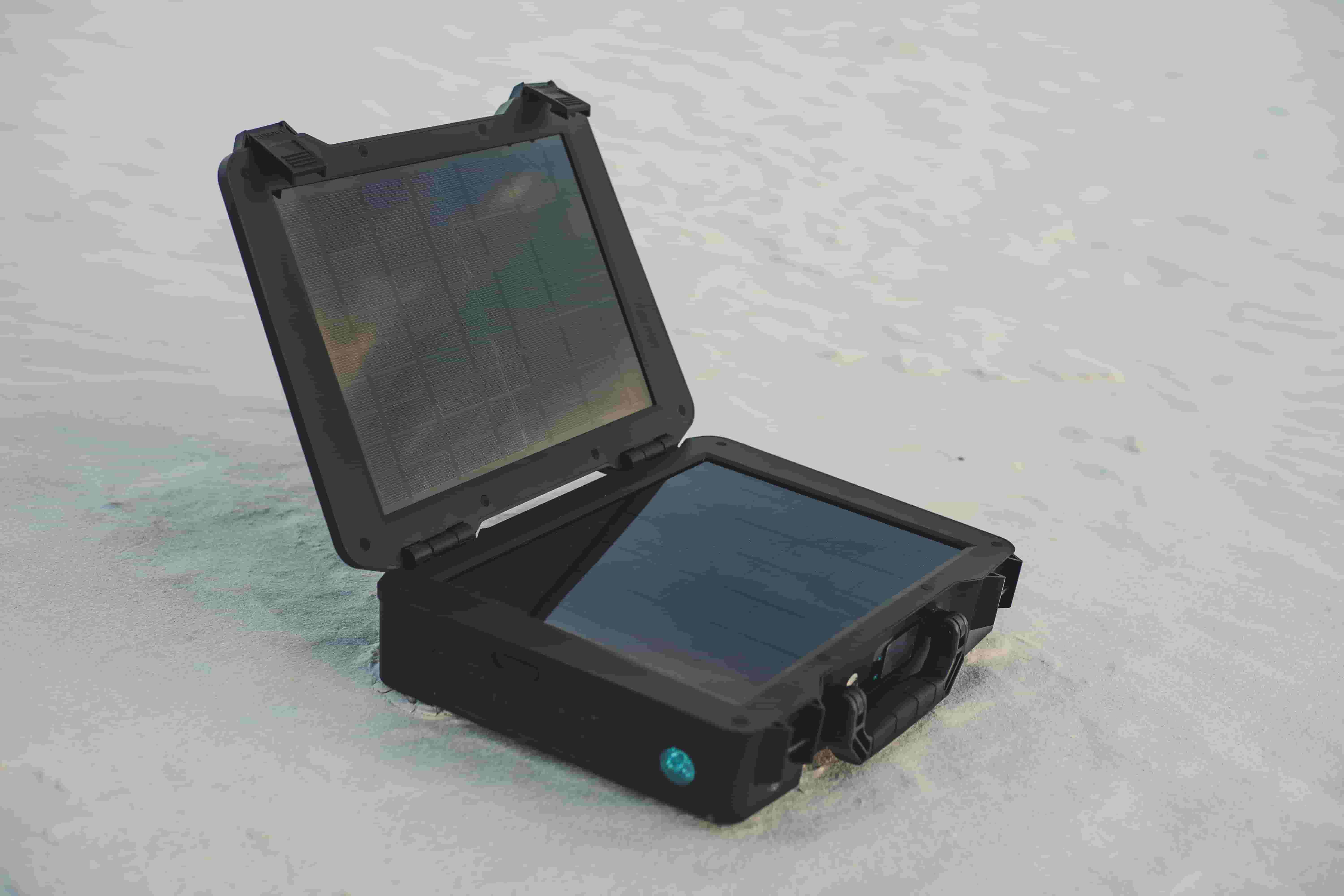
How many solar panels will I need?
To size a system that will best fit your needs, we recommend making a list of all the devices you plan on running. Get the wattage information, or the amps and volts of the product, and provide an average run time per device.
The Renogy solar panel calculator is a great tool that makes it a quick and easy process to help determine your specific needs. The solar sizing calculator allows you to input information about your lifestyle to help you decide on your solar panel requirements. You’ll just need to know what total watts your electronics will consume, how long you plan on running the devices, your charge controller efficiency, and average sun hours per day. The solar panel calculator will then be able to tell you the minimum and recommended system size, as well as the recommended battery output.
Having an accurate understanding of your energy needs will give you a better idea of the costs and ensure you don’t under- or over-build a system.
What if I just want to charge my phone or tablet?
Renogy also has a range of smaller panels, power banks and solar chargers that make charging devices with the power of the sun easy and convenient. These panels are equipped with a USB port, allowing you to just plug-and-charge.
This means you don’t have to tap into your battery bank on your RV, van, or home to charge these devices, such as a laptop, mobile phone, or tablet.
In short, portable solar panels are a great solution for those that live their lives on the go, have minimal energy needs, and are looking for an affordable way to start using solar energy.
See other related articles at Renogy:
Solar Panels 101: A Beginner's Guide
The Ultimate Guide To DIY Off-Grid Solar Systems
Do solar panels increase home value
how efficient are solar panels
How Many Solar Panels Do I Need
